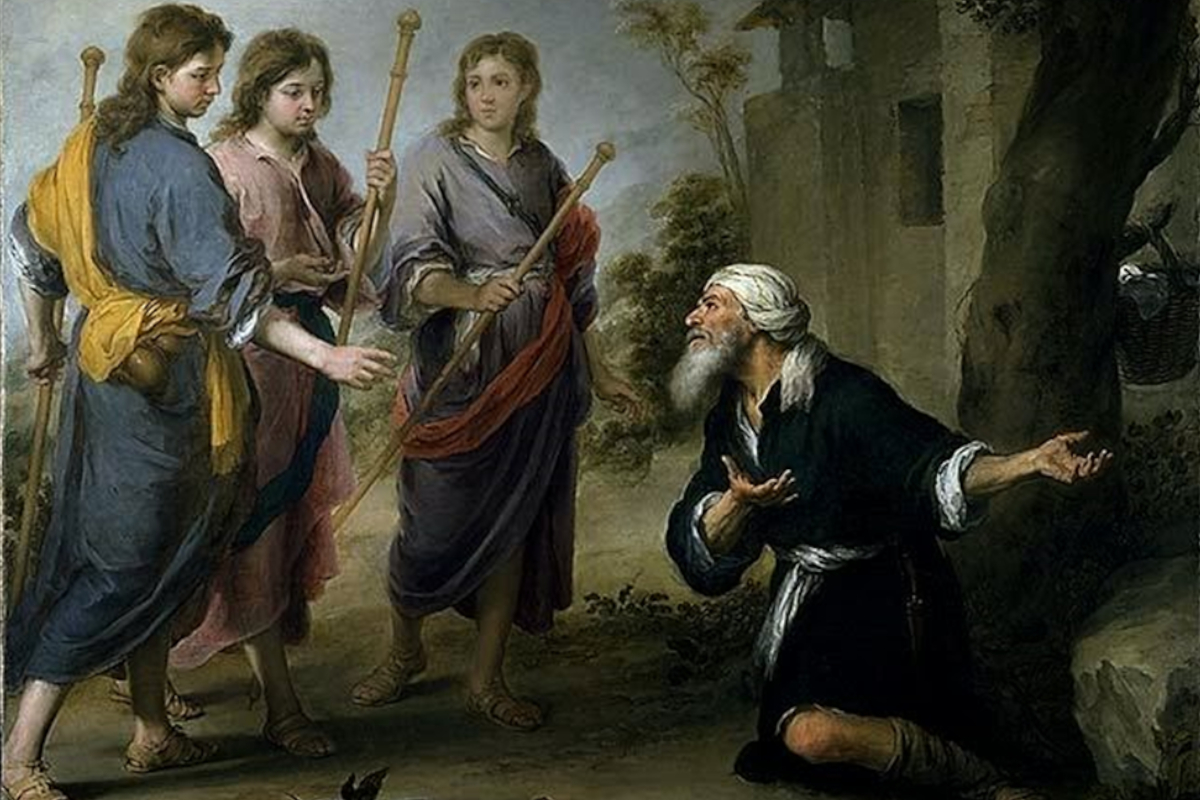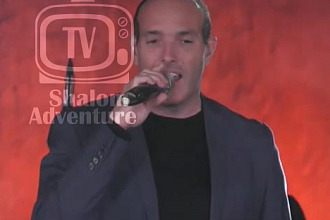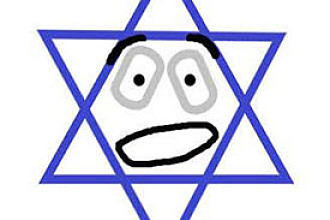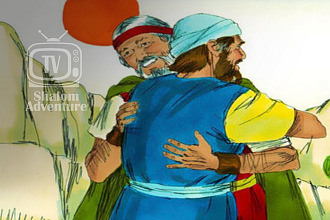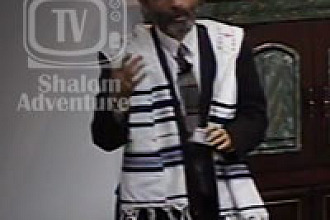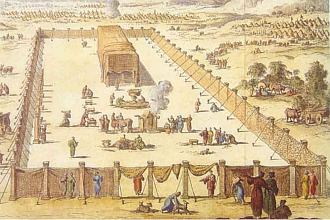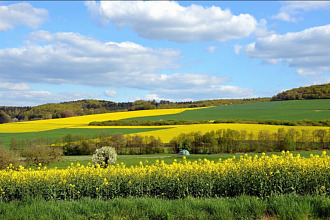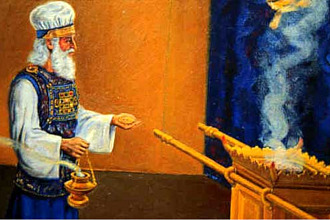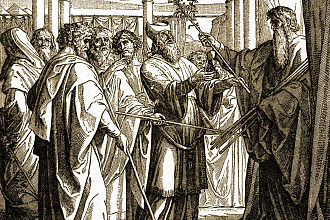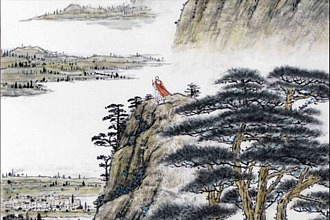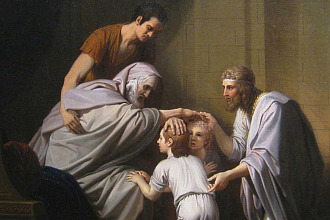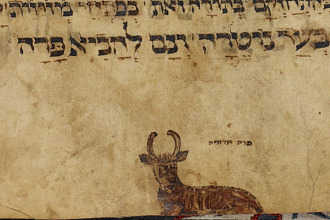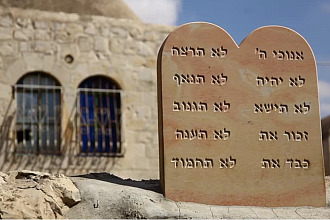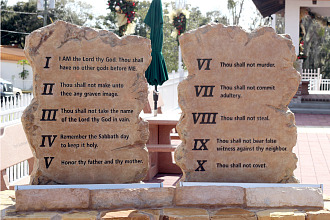Parasha for the Week: Vayera: Gen:18:1 – 22:24
Haftarah for the Week: 2 Kings 4:1 - 37
Apostolic Writings: Mark 10:41 - 52
Overview:
Three days after performing the brit-mila “circumcision” on himself, Abraham is visited by G-d. Three angels appear in human form to Abraham. Abraham rushes to show them hospitality by bringing them into his tent, despite this most painful time after the operation.
Sarah laughs when she hears from them that she will bear a son next year.
G-d reveals to Abraham that He will destroy Sodom, and Abraham pleads for Sodom to be spared.
G-d agrees that if there are fifty righteous people in Sodom He will not destroy it. Abraham “bargains” G-d down to ten righteous people. However, not even ten can be found.
Lot, his wife and two daughters are rescued just before sulfur and fire rains down on Sodom and her sister cities. Lot’s wife looks back and is turned into a pillar of salt.
Lot’s daughters fear that as a result of the destruction there will be no husbands for them. They decide to get their father drunk and through him to perpetuate the human race. From the elder daughter, Moab is born, and from the younger, Ammon.
Abraham moves to Gerar where Abimelech abducts Sarah. After G-d appears to Abimelech in a dream, he releases Sarah and appeases Abraham.
As promised, a son, Itzchak, is born to Sarah and Abraham. On the eighth day after the birth, Abraham circumcises him as commanded.
Abraham makes a feast the day Itzchak is weaned.
Sarah tells Abraham to banish Hagar and Hagar’s son Ishmael because she sees in him signs of degeneracy.
Abraham is distressed at the prospect of banishing his son, but G-d tells him to listen to whatever Sarah tells him to do. After nearly dying of thirst in the desert, Ishmael is rescued by an angel and G-d promises that he will be the progenitor of a mighty nation.
Abimelech enters into an alliance with Abraham when he sees that G-d is with him. In a tenth and final test, G-d instructs Abraham to take Itzchak, who is now 37, and to offer him as a sacrifice. Abraham does this, in spite of ostensibly aborting Israel nationhood and contradicting his life-long preaching against human sacrifice. At the last moment, G-d sends an angel to stop Abraham.
Because of Abraham’s unquestioning obedience, G-d promises him that even if the Jewish People sin, they will never be completely dominated by their foes.
The parasha ends with the genealogy and birth of Rivka.
"Abraham the Prophet"
The parasha starts saying, “Then Adonai appeared to Abraham at Mamre’s large trees while he was sitting in the entrance of his tent during the heat of the day.” (Genesis 18:1). This is the first time we see Abraham in his role as a Nabi, for like a Nabi he stands here before G-d, Who reveals “His plan to his servants the prophets.” (Amos 3:7). According to the Jewish tradition, prophecy does not come when there is sorrow or sloth, frivolity or levity, chatter or foolishness; it comes as a result of joy and faithfulness to G-d’s Word.
G-d revealed to Abraham the destruction of Sodom and her sister city of the plain. But Abraham wanted to exercise hospitality towards the three visitors who passed by his tent. The Jewish tradition says “Providing hospitality to guests is greater than standing before the Divine Presence” (Shabbat 127a).
It is interesting to note the manner in which he fulfills this duty. Avraham here pursues charity and kindness more eagerly than people pursue monetary gain! He seizes the opportunity, as the first circumcised believer, to show kindness to his fellow man. He involves his wife and his son, indeed his entire household, in the fulfillment of the mitzvah. He has everything freshly prepared. This is the first reception that was given to the first guests to present themselves to the first Nimoul (circumcized).
"Abraham G-d’s Instrument"
The Torah states, “For I have made myself known to him so that he will command his sons and his household after him to keep the way of Adonai by doing righteousness and justice, so that Adonai may bring upon Abraham what He has spoken about him.” (Genesis 18:19). If one is not a devoted follower of G-d, he is under G-d’s general providence. But if one walks in the light of G-d’s presence; if one considers himself merely an instrument of G-d on earth, then G-d in turn watches over him with special care, he is favored with G-d’s special providence. As we seek G-d, so does He seek us. If one walks with G-d incidentally; if doing G-d’s will is not one’s first and foremost aim, but rather, one pursues other endeavors, leaving to chance whether these endeavors coincide with G-d’s will, then G-d too walks with him and leave him to the vicissitude of chance.
Rabbi Hirsch completes this picture of relationships between G-d and human beings saying: the righteous, who devote themselves to being instruments of G-d’s Will on earth, who regard doing His Will as the sole aim of their lives and actions, and cast their burden and all their needs on G-d their provider — He goes before them with His guiding hand and watches over them with His special providence. This special providence is called in Hebrew and in our text Yada’ (first word of the verse 19).
“Test or Temptation”
Abraham says to G-d: “Suppose there are fifty righteous within the city.” (Genesis 18:24). Rabbi Hirsch gives us a description of Abraham’s righteousness according to the Hebrew tradition, he dwells Betoch Ha’ir “in the midst of the city” in lively connection with he whole environment. He never ceases admonishing and teaching, objecting and warning, rectifying and saving, as much as he is able. He is attentive to everyone, and never tires of trying to right things. He never despairs of man, and hasten to undertake any action for the sake of man.
Like a gardener who lovingly tends a seedling, so does the righteous man perceive his task of righting and saving his fellow man. How can he bear to see the destruction of those he nurtured to whom his soul is so attached! For the sake of fifty of such men, who are found Betoch Ha’ir all of Sodom might be spared.
The chachamim (Israel’s scholars) say that, during the destruction of Yerushalayim (Jerusalem), the righteous one, those who were faithful to the Torah, were the first to be slaughtered, because they had not been Betoch Ha’ir — they had not protested and had not brought people back to the right path, where possible (Shabbat 55a commenting on Ezechiel 9:4-6).
The Torah continues: “Then he said, ‘Please, let not my Lord be angry, so I may speak once more. Perhaps ten will be found there?’ And He said, ‘I will not destroy it for the sake of the ten’.” (Genesis 18:32)). If even only ten righteous individuals had been found in Sodom and Gomorrah, G-d would have not despaired of the wicked and the sinful. Out of hope for a better future, G-d would have spared the whole community for the sake of that future. The Jewish tradition has built a story saying that if the world subsists until today it is because there are at least ten righteous living in the world.
HAFTARAH: 2 Kings 4:1 - 37
This chapter of the second book of Kings tells us about the Ministry of Elisha and Gehazi his servant to an unnamed lady called the Shunammite, that means a native of Shunem, a place belonging to the tribe of Issachar. This place lies in a very rich section of Israel a short distance north of Jezreel at the foot of “Little Hermon.”
The rabbis have read this Haftara in connection with the Parasha Vayera because of their evidence parallel.
Parasha: The angel who visited Abraham said: “I will surely return to you in due season, and your wife Sarah shall have a son.” (Genesis 18:10). It is a promise to Sarah that she will have a son.
Haftara: Elisha plays the role of the angel in this text. He said to the Shunammite: “At this season, in due time, you shall embrace a son.” She replied, “No, my lord, O man of God; do not deceive your servant.” The woman conceived and bore a son at that season, in due time, as Elisha had declared to her.” (2Kings 4:16,17)
The next point about this haftara is that this story is special for its length and complexity. Usually the miracle in the Hebrew Bible are short and rare, but this text is an exception. Elisha wants to reward the Shunammith for her kindness to him and not only did he promise to her that she will have a son, but later when this son died, he raised him.
In the parasha we have also a complex text with many miracles, it seems to us that Abraham’s life was a succession of miracles. In Genesis 18 to 22 we see: first miracle: he is practicing on himself circumcision and survived to it. Second miracle: Three angels appeared to Abraham. Third miracle: they announced to Sarah that she will have a boy and that happened the next year. Fourth miracle: G-d announced to Abraham the destruction of Sodom, that happened but Lot and his daughter are miraculously saved. Fifth miracle: God appeared to Abimelech in order to save Sarah from dishonor. Sixth miracle: An Angel saves Hagar and Ishmael from death in the desert. Seventh miracle: God saves Itzchak from being sacrifice by his father by stopping the hand of the killer and providing a ram to be sacrificed instead of the son.
APOSTOLIC WRITINGS: Mark 10:41 - 52
The first topic of this parasha is about leadership, humility and hospitality. Abraham is the chief of his people, however he never uses his position as a leader to impose his view on his followers. When Lot wanted to separate himself from the tribe of Abraham, he accepted and shared his possession with him, when Sarah asked him to send away Hagar, he accepted even though he was not happy with this request.
In this parasha as Abraham was taking some rest at the shadow of a tree close to his tent, he saw three travelers coming to him. He forgot his role: “chief of a great clan” and run to meet these people in order to exercise his hospitality. Abraham was full of humility before these people: “When he saw them, he ran from the entrance of his tent to meet them and bowed down to the ground.” (Genesis 18:2). Abraham’s attitude is in contrast with James and John, disciples of Yeshua, who lacking humility requested: “Grant us to sit, one at your right hand and one at your left, in your glory.” (Mark 10:37). They were waiting for the kingdom of G-d, which will be established by the Messiah, they wanted to be the two main leaders in this kingdom. Of course, the other disciples who were Simon-Peter, Andrew; Philip, Bartholomew, Thomas, Matthew, James ben Alphaeus, Thaddaeus, Simon the Zealot, and Judah Ishkariot were not happy. It looked like a conspiracy to take the power from their hands: “And when the ten heard it, tthey began to be indignant at James and John.” (Mark 10:41). This experience could have been a disaster for the new group of the followers of Yeshua, it could destroy all confidence and trust between this group of friends, but Yeshua knew how to deal with this situation and said to them: “You know that those who are considered rulers of the Gentiles lord it over them, and their great ones exercise authority over them. But it shall not be so among you. But whoever would be great among you must be your servant, and whoever would be first among you must be slave of all. For even the Son of Man came not to be served but to serve, and to give his life as a ransom for many.” (Mark 10:42–45). The main rule of leadership among the followers of Yeshua is humility and “servant-leadership.” Yeshua, the great Master and the L-rd gave the first example of this revolutionary concept of “servant-leadership”, if we want to be a good leader in the movement of Yeshua, we have to start to serve.
Yeshua called himself the “Son of Man” this expression comes from the Hebrew Bible, especially from the chapter 7 of prophet Daniel. This “Son of Man” according to the prophet Daniel is in heaven and is coming from heaven assuming all authority of G-d: “I saw in the night visions, and behold, with the clouds of heaven … And to him was given dominion and glory and a kingdom, that all peoples, nations, and languages should serve him” (Daniel 7:13–14). This “Son of Man” said Yeshua “came not to be served but to serve” more than that, he did not come only to serve but to die for everyone “to give his life as a ransom for many.”
Yeshua’s talmidim did not get a good understanding of the kingdom of G-d and its governing rules. They needed to pass through two experiences: the painful separation from their leader, and the receiving of the Ruah Elohim, or Ruah Hakodesh, the Holy Spirit. Yeshua knew it, that is why he said to them in the Besorah of Yochanan: “But the Helper, the Holy Spirit, whom the Father will send in my name, he will teach you all things and bring to your remembrance all that I have said to you.” (John 14:26).
This same lesson about leadership is given in the parasha by Abraham meeting Abimelech. The king of Gerar was a dictator and despot who did whatever pleased him, especially with women. Abraham’s wife, Sarah was a beautiful lady, and in spite of her old age Sarah was still a very attractive lady. King Abimelech wanted to have intercourse with her. He was not interested in marriage, just pleasure. He took her without Abraham’s permission, it was a kidnapping: “And King Abimelech of Gerar sent and took Sarah” (Genesis 20:2). It was a difficult time for women, they had no freedom at all, when they were born, they belonged to their father, if the father died they belonged to their older brother, and when they were married they belonged to their husband. No freedom at all. Once again, after dealing with Pharaoh, Abraham had to deal with this new situation, he did it with great wisdom and humility. He was a real “servant-leader” and knew that G-d would solve his problem: “But God came to Abimelech in a dream by night, and said to him, ‘You are about to die because of the woman whom you have taken; for she is a married woman.’” (Genesis 20:3), and then he respected Abraham and his wife.
Another parallel between the parasha and the besorah is about the many miracles performed in favor of Abraham in the parasha and the miracles performed by Yeshua. In the Genesis 18 G-d came to announce to Abraham the destruction of Sodom and Gommorah, in the chapter 19, G-d saved Lot and his two daughters who were spiritually blind about the great power of the G-d of Abraham. in the Chapter 20, G-d intervened in the heart of the Abimelech and released Sarah, Abraham’s wife. In the chapter 21, the great miracle of the birth of Itzchak was performed, and Sarah who was very old and Abraham 100 years old. And in the chapter 22, we have the Akeda, another test for Abraham, and another miracle to save Itzchak from death. Yeshua was the master of miracles, if all the miracle in the parasha were performed by G-d in favor of Abraham, all the miracle in the Besorah were performed by Yeshus himself. In this part of the Besorah yeshua healed Bartimaeus (the son of Timaeus) who was blind “Yeshua said, “What do you want Me to do for you?” The blind man said, “Rabboni, I want to see again!” Yeshua said to him, “Go! Your faith has made you well.” Instantly he regained his sight and began following Yeshua down the road.” (Mark 10:46-52). The Bible is not about doctrine and theology, the Hebrew Bible and the Apostolic Writings as well are about life, faith, and experience with G-d. He wants to be in our heart, in our life and to heal our blindness, let’s our heart to be touched by Adonai, the God of the Bible.

